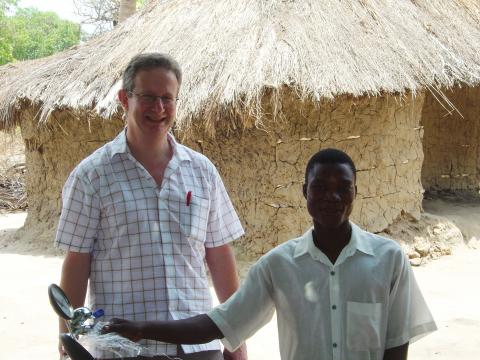CRC@25: Children have much to contribute to justice

This year is an important time for child rights advocates to celebrate and reflect on the Convention on the Rights of the Child (CRC) which turns 25 in November. The CRC has had an enormous impact on the lives of millions of children worldview and has recognized civil, cultural, political, economic and social rights for all children. Countries have made considerable efforts to embed this international normative framework in domestic legislations, policies and institutions.
It is crystal clear to me that these major advances are contributing to improve the well-being of children, however, often I wonder how these international laws and policies are impacting the daily lives of children, especially around the CRC foundational principle of participation.
I have been to the Democratic Republic of Congo (DRC) several times and I have met many children who live in fear due to the long and deadly conflict that affects the Great Lakes region. Children experience ethnic, religious and political violence, and also face broken relationships and a lack of space to participate and have their voices heard. Girls particularly experience systematic segregation based on traditional attitudes that discourage the equal participation based on gender bias. However, despite the stereotypes and obstacles, some girls are already leading their communities towards a better future. One example is Jennifer, President of the Child’s Parliament in Kinkole, outside of Kinshasa, a girl that I was honored to meet in one of my visits to DRC.
Jennifer says: “What makes me believe things will change for children is the rapid change the Children’s Parliament has already brought to the mentalities, beliefs and customs within [my] community. The members of the community now know that the rights of children, moreover of girls, are applicable.”
I never cease to be impressed by how children like Jennifer are able to clearly point to core issues. Evidence to this is the many World Vision consultations where children are asked about the situation in their communities, and how to improve it, and their response is very concrete. They have the passion and drive to exert influence with their peers, community or country.
I personally believe that we can promote peace and reconciliation in the Great Lakes region by ensuring that children and young people have a space to participate and contribute to peace processes. The Committee on the Rights of the Child in its General Comments No 12 emphasized that children have much to contribute to justice, peace and reconciliation. Children should be encouraged and enabled to participate, and by doing this they will regain control of their lives, develop life skills and confidence.
If we do not include children and youth in the process, we will never be able to contribute to conflict transformation in this volatile region. I am not saying that all problems will be resolved by including children but it is an important factor that could contribute to the process. Nevertheless, I am aware that children experience enormous limitations to their right to participate and to be listened to. These limitations affect children from different countries, cultures and backgrounds not just those from the DRC.
Let’s use the 25th anniversary of the CRC to celebrate the space that children have gained and look ahead to create more frameworks to empower children to speak up for their rights and equip them with the tools and skills required to participate actively in decisions that affect their lives.
Discover World Vision's CRC@25 blog series.
About the author
Charles Badenoch is World Vision International's Partnership Leader, Advocacy and Justice for Children. Previously, Badenoch was chief executive at World Vision U.K., joining the organization in Oct. 2003 following an extensive commercial career. He is passionate about increasing World Vision’s emphasis on advocacy and justice for children and is focused on ensuring that the voices of children are heard and acted upon in the post-2015 process.